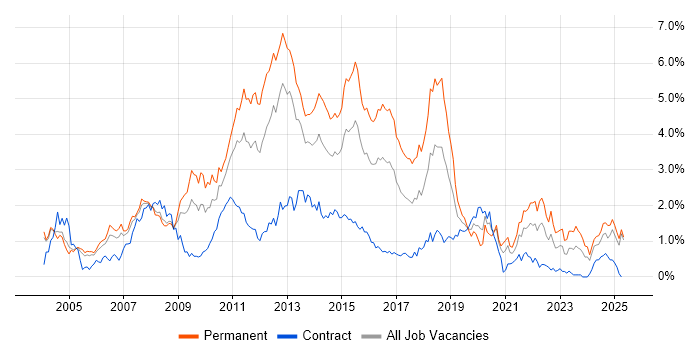Transact-SQL
South East > Buckinghamshire
The table below provides summary statistics and salary benchmarking for jobs advertised in Buckinghamshire requiring T-SQL skills. It covers permanent job vacancies from the 6 months leading up to 20 February 2026, with comparisons to the same periods in the previous two years.
| 6 months to 20 Feb 2026 |
Same period 2025 | Same period 2024 | |
|---|---|---|---|
| Rank | 73 | 69 | 97 |
| Rank change year-on-year | -4 | +28 | -2 |
| Permanent jobs citing T-SQL | 16 | 22 | 16 |
| As % of all permanent jobs in Buckinghamshire | 1.10% | 2.33% | 1.02% |
| As % of the Programming Languages category | 7.96% | 8.15% | 3.58% |
| Number of salaries quoted | 16 | 16 | 16 |
| 10th Percentile | - | £45,375 | - |
| 25th Percentile | £30,500 | £50,750 | £41,250 |
| Median annual salary (50th Percentile) | £35,000 | £56,250 | £42,500 |
| Median % change year-on-year | -37.78% | +32.35% | -15.00% |
| 75th Percentile | £38,750 | £60,000 | £43,750 |
| 90th Percentile | £42,500 | £75,000 | - |
| South East median annual salary | £40,000 | £50,000 | £57,500 |
| % change year-on-year | -20.00% | -13.04% | +9.52% |
All Programming Languages
Buckinghamshire
T-SQL falls under the Programming Languages category. For comparison with the information above, the following table provides summary statistics for all permanent job vacancies requiring coding skills in Buckinghamshire.
| Permanent vacancies with a requirement for coding skills | 201 | 270 | 447 |
| As % of all permanent jobs advertised in Buckinghamshire | 13.85% | 28.57% | 28.51% |
| Number of salaries quoted | 165 | 153 | 355 |
| 10th Percentile | £32,700 | £36,500 | £35,800 |
| 25th Percentile | £40,000 | £47,500 | £41,250 |
| Median annual salary (50th Percentile) | £55,000 | £60,000 | £52,501 |
| Median % change year-on-year | -8.33% | +14.28% | +0.00% |
| 75th Percentile | £67,500 | £68,250 | £61,250 |
| 90th Percentile | £77,500 | £76,000 | £80,000 |
| South East median annual salary | £58,000 | £60,000 | £55,000 |
| % change year-on-year | -3.33% | +9.09% | -4.35% |
T-SQL
Job Vacancy Trend in Buckinghamshire
Historical trend showing the proportion of permanent IT job postings citing T-SQL relative to all permanent IT jobs advertised in Buckinghamshire.

T-SQL
Salary Trend in Buckinghamshire
Salary distribution trend for jobs in Buckinghamshire citing T-SQL.

T-SQL
Job Locations in Buckinghamshire
The table below looks at the demand and provides a guide to the median salaries quoted in IT jobs citing T-SQL within the Buckinghamshire region over the 6 months to 20 February 2026. The 'Rank Change' column provides an indication of the change in demand within each location based on the same 6 month period last year.
| Location | Rank Change on Same Period Last Year |
Matching Permanent IT Job Ads |
Median Salary Past 6 Months |
Median Salary % Change on Same Period Last Year |
Live Jobs |
|---|---|---|---|---|---|
| Milton Keynes | -25 | 4 | £40,000 | -28.89% | 5 |
| T-SQL South East |
|||||
T-SQL
Co-Occurring Skills & Capabilities in Buckinghamshire by Category
The following tables expand on the one above by listing co-occurrences grouped by category. They cover the same employment type, locality and period, with up to 20 co-occurrences shown in each category:
